Ethical Dilemma of Civil Engineering: Practise and Challenges
VerifiedAdded on 2020/10/22
|9
|2744
|61
Essay
AI Summary
This essay examines the ethical dilemmas encountered by civil engineers in their professional practice. It begins with an introduction to the importance of ethics and codes of conduct in civil engineering, emphasizing the significance of safety, public welfare, and sustainable development. The report addresses various ethical challenges, such as balancing client requirements with public impact and ensuring the use of appropriate materials and site selection. It also highlights specific challenges like proper sea level estimation, gender equality, groundwater ascertainment, traffic congestion reduction, and improving safety at construction sites. The essay references codes of ethics, challenges, and real-world examples like the Tangier Island erosion and the North Battleford water treatment failure. The conclusion underscores the need for engineers to adhere to ethical principles and address challenges to ensure public safety and well-being. The essay underscores the importance of professional ethics and its impact on the safety and well-being of society.
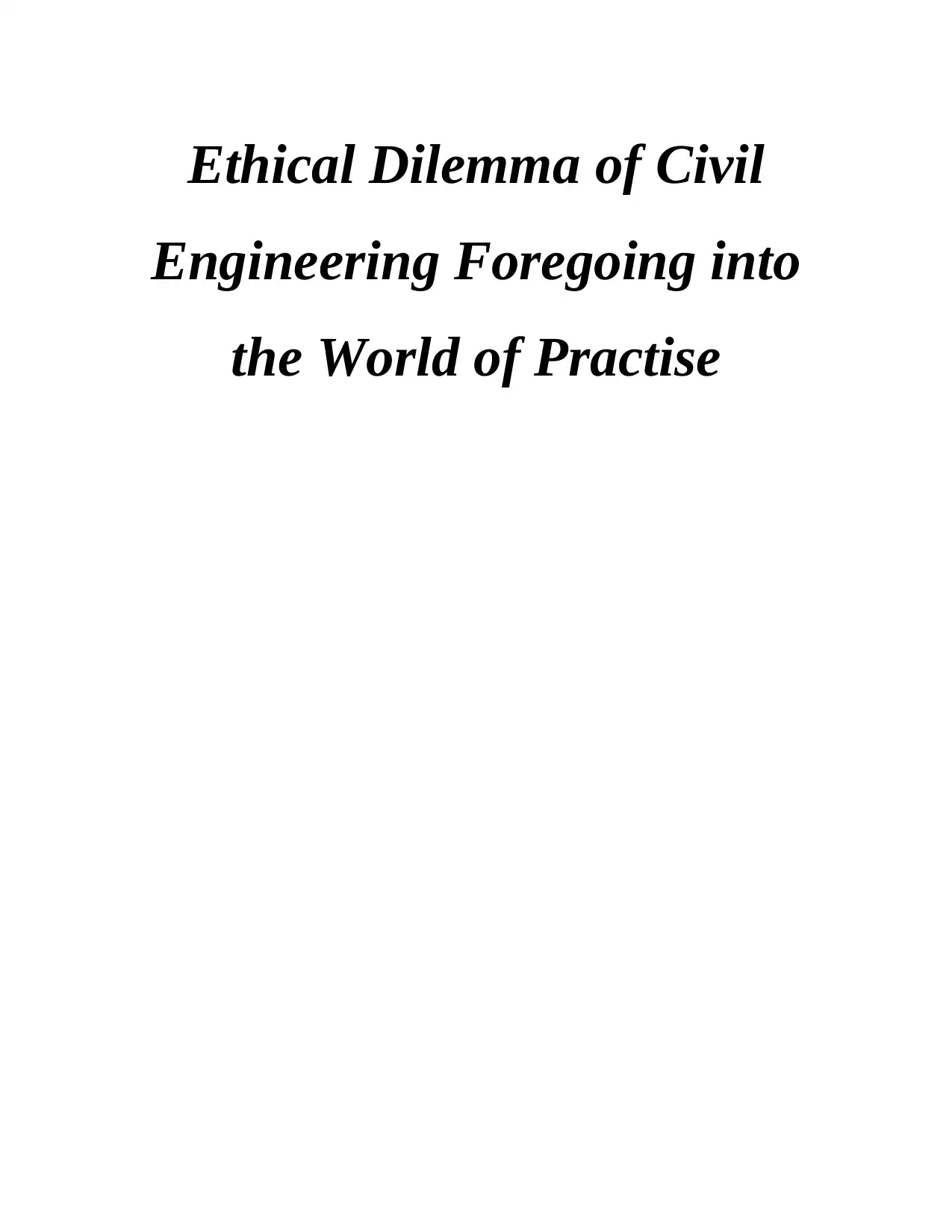
Ethical Dilemma of Civil
Engineering Foregoing into
the World of Practise
Engineering Foregoing into
the World of Practise
Paraphrase This Document
Need a fresh take? Get an instant paraphrase of this document with our AI Paraphraser
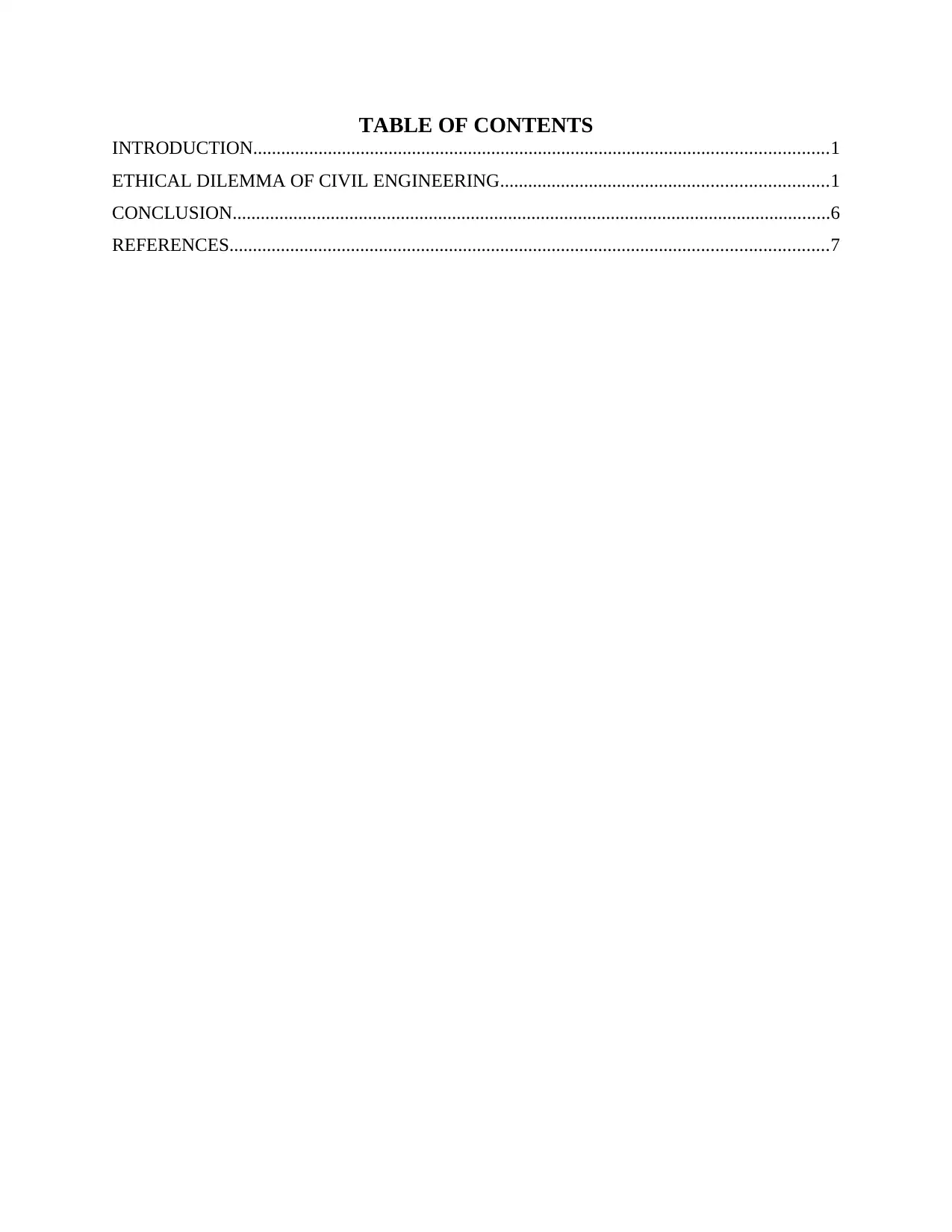
TABLE OF CONTENTS
INTRODUCTION...........................................................................................................................1
ETHICAL DILEMMA OF CIVIL ENGINEERING......................................................................1
CONCLUSION................................................................................................................................6
REFERENCES................................................................................................................................7
INTRODUCTION...........................................................................................................................1
ETHICAL DILEMMA OF CIVIL ENGINEERING......................................................................1
CONCLUSION................................................................................................................................6
REFERENCES................................................................................................................................7
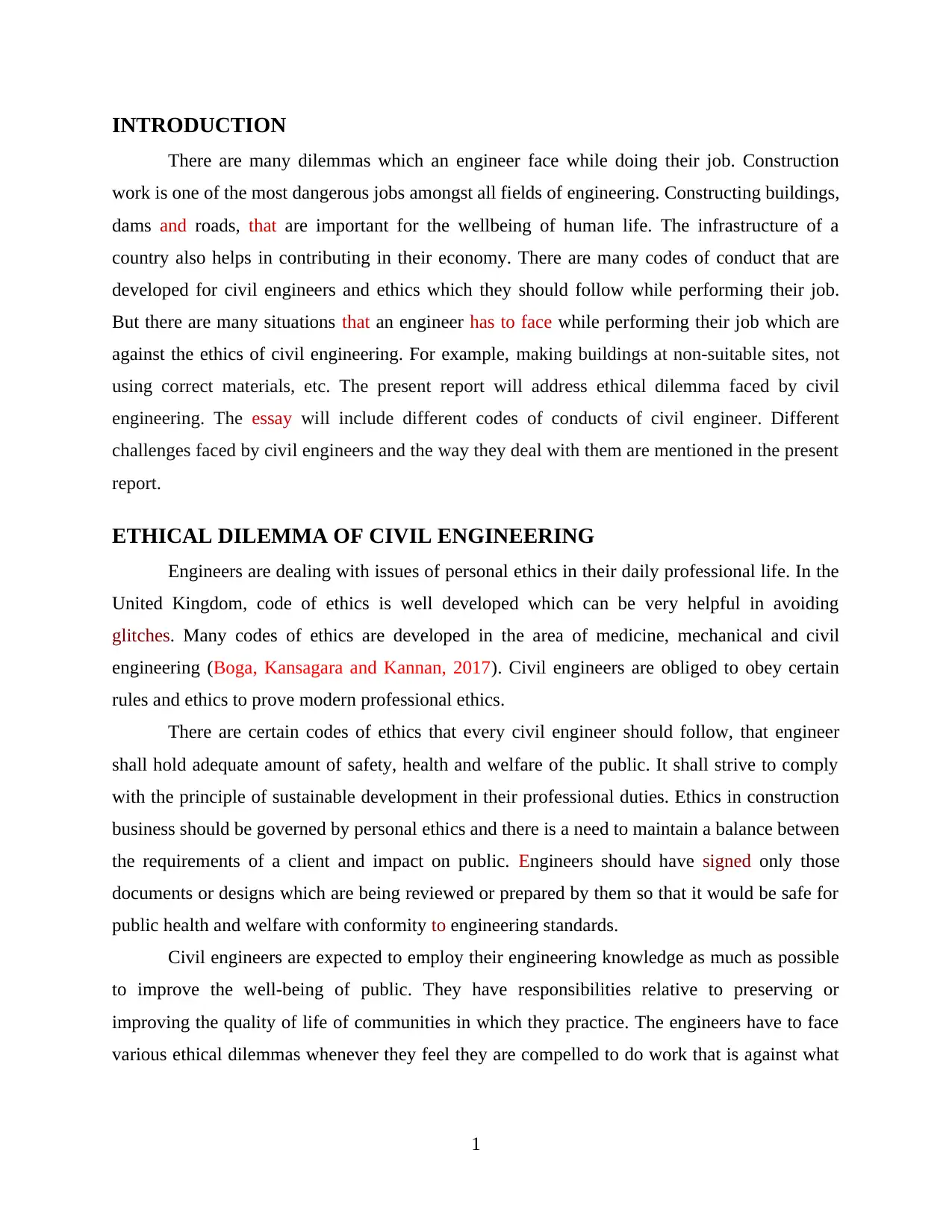
INTRODUCTION
There are many dilemmas which an engineer face while doing their job. Construction
work is one of the most dangerous jobs amongst all fields of engineering. Constructing buildings,
dams and roads, that are important for the wellbeing of human life. The infrastructure of a
country also helps in contributing in their economy. There are many codes of conduct that are
developed for civil engineers and ethics which they should follow while performing their job.
But there are many situations that an engineer has to face while performing their job which are
against the ethics of civil engineering. For example, making buildings at non-suitable sites, not
using correct materials, etc. The present report will address ethical dilemma faced by civil
engineering. The essay will include different codes of conducts of civil engineer. Different
challenges faced by civil engineers and the way they deal with them are mentioned in the present
report.
ETHICAL DILEMMA OF CIVIL ENGINEERING
Engineers are dealing with issues of personal ethics in their daily professional life. In the
United Kingdom, code of ethics is well developed which can be very helpful in avoiding
glitches. Many codes of ethics are developed in the area of medicine, mechanical and civil
engineering (Boga, Kansagara and Kannan, 2017). Civil engineers are obliged to obey certain
rules and ethics to prove modern professional ethics.
There are certain codes of ethics that every civil engineer should follow, that engineer
shall hold adequate amount of safety, health and welfare of the public. It shall strive to comply
with the principle of sustainable development in their professional duties. Ethics in construction
business should be governed by personal ethics and there is a need to maintain a balance between
the requirements of a client and impact on public. Engineers should have signed only those
documents or designs which are being reviewed or prepared by them so that it would be safe for
public health and welfare with conformity to engineering standards.
Civil engineers are expected to employ their engineering knowledge as much as possible
to improve the well-being of public. They have responsibilities relative to preserving or
improving the quality of life of communities in which they practice. The engineers have to face
various ethical dilemmas whenever they feel they are compelled to do work that is against what
1
There are many dilemmas which an engineer face while doing their job. Construction
work is one of the most dangerous jobs amongst all fields of engineering. Constructing buildings,
dams and roads, that are important for the wellbeing of human life. The infrastructure of a
country also helps in contributing in their economy. There are many codes of conduct that are
developed for civil engineers and ethics which they should follow while performing their job.
But there are many situations that an engineer has to face while performing their job which are
against the ethics of civil engineering. For example, making buildings at non-suitable sites, not
using correct materials, etc. The present report will address ethical dilemma faced by civil
engineering. The essay will include different codes of conducts of civil engineer. Different
challenges faced by civil engineers and the way they deal with them are mentioned in the present
report.
ETHICAL DILEMMA OF CIVIL ENGINEERING
Engineers are dealing with issues of personal ethics in their daily professional life. In the
United Kingdom, code of ethics is well developed which can be very helpful in avoiding
glitches. Many codes of ethics are developed in the area of medicine, mechanical and civil
engineering (Boga, Kansagara and Kannan, 2017). Civil engineers are obliged to obey certain
rules and ethics to prove modern professional ethics.
There are certain codes of ethics that every civil engineer should follow, that engineer
shall hold adequate amount of safety, health and welfare of the public. It shall strive to comply
with the principle of sustainable development in their professional duties. Ethics in construction
business should be governed by personal ethics and there is a need to maintain a balance between
the requirements of a client and impact on public. Engineers should have signed only those
documents or designs which are being reviewed or prepared by them so that it would be safe for
public health and welfare with conformity to engineering standards.
Civil engineers are expected to employ their engineering knowledge as much as possible
to improve the well-being of public. They have responsibilities relative to preserving or
improving the quality of life of communities in which they practice. The engineers have to face
various ethical dilemmas whenever they feel they are compelled to do work that is against what
1
⊘ This is a preview!⊘
Do you want full access?
Subscribe today to unlock all pages.

Trusted by 1+ million students worldwide
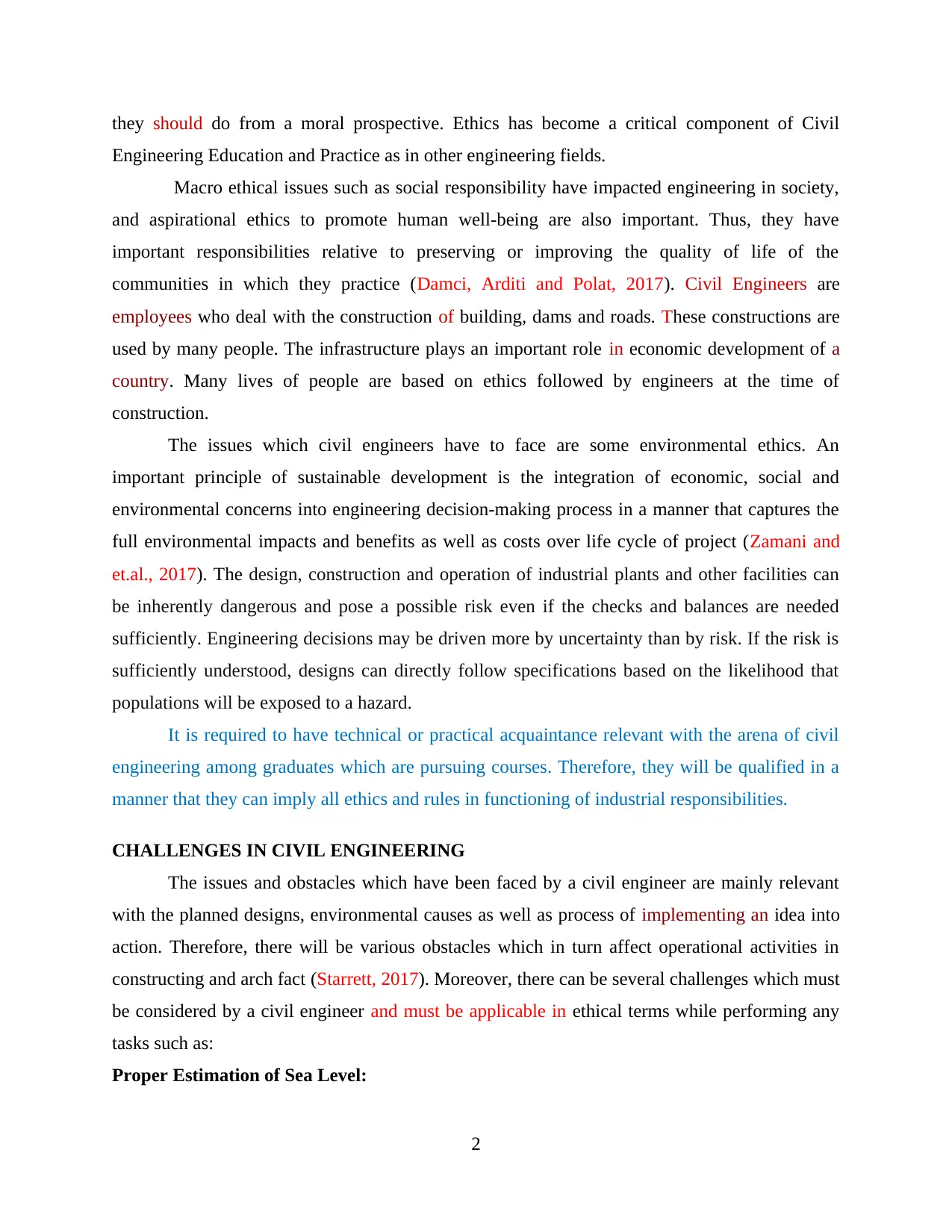
they should do from a moral prospective. Ethics has become a critical component of Civil
Engineering Education and Practice as in other engineering fields.
Macro ethical issues such as social responsibility have impacted engineering in society,
and aspirational ethics to promote human well-being are also important. Thus, they have
important responsibilities relative to preserving or improving the quality of life of the
communities in which they practice (Damci, Arditi and Polat, 2017). Civil Engineers are
employees who deal with the construction of building, dams and roads. These constructions are
used by many people. The infrastructure plays an important role in economic development of a
country. Many lives of people are based on ethics followed by engineers at the time of
construction.
The issues which civil engineers have to face are some environmental ethics. An
important principle of sustainable development is the integration of economic, social and
environmental concerns into engineering decision-making process in a manner that captures the
full environmental impacts and benefits as well as costs over life cycle of project (Zamani and
et.al., 2017). The design, construction and operation of industrial plants and other facilities can
be inherently dangerous and pose a possible risk even if the checks and balances are needed
sufficiently. Engineering decisions may be driven more by uncertainty than by risk. If the risk is
sufficiently understood, designs can directly follow specifications based on the likelihood that
populations will be exposed to a hazard.
It is required to have technical or practical acquaintance relevant with the arena of civil
engineering among graduates which are pursuing courses. Therefore, they will be qualified in a
manner that they can imply all ethics and rules in functioning of industrial responsibilities.
CHALLENGES IN CIVIL ENGINEERING
The issues and obstacles which have been faced by a civil engineer are mainly relevant
with the planned designs, environmental causes as well as process of implementing an idea into
action. Therefore, there will be various obstacles which in turn affect operational activities in
constructing and arch fact (Starrett, 2017). Moreover, there can be several challenges which must
be considered by a civil engineer and must be applicable in ethical terms while performing any
tasks such as:
Proper Estimation of Sea Level:
2
Engineering Education and Practice as in other engineering fields.
Macro ethical issues such as social responsibility have impacted engineering in society,
and aspirational ethics to promote human well-being are also important. Thus, they have
important responsibilities relative to preserving or improving the quality of life of the
communities in which they practice (Damci, Arditi and Polat, 2017). Civil Engineers are
employees who deal with the construction of building, dams and roads. These constructions are
used by many people. The infrastructure plays an important role in economic development of a
country. Many lives of people are based on ethics followed by engineers at the time of
construction.
The issues which civil engineers have to face are some environmental ethics. An
important principle of sustainable development is the integration of economic, social and
environmental concerns into engineering decision-making process in a manner that captures the
full environmental impacts and benefits as well as costs over life cycle of project (Zamani and
et.al., 2017). The design, construction and operation of industrial plants and other facilities can
be inherently dangerous and pose a possible risk even if the checks and balances are needed
sufficiently. Engineering decisions may be driven more by uncertainty than by risk. If the risk is
sufficiently understood, designs can directly follow specifications based on the likelihood that
populations will be exposed to a hazard.
It is required to have technical or practical acquaintance relevant with the arena of civil
engineering among graduates which are pursuing courses. Therefore, they will be qualified in a
manner that they can imply all ethics and rules in functioning of industrial responsibilities.
CHALLENGES IN CIVIL ENGINEERING
The issues and obstacles which have been faced by a civil engineer are mainly relevant
with the planned designs, environmental causes as well as process of implementing an idea into
action. Therefore, there will be various obstacles which in turn affect operational activities in
constructing and arch fact (Starrett, 2017). Moreover, there can be several challenges which must
be considered by a civil engineer and must be applicable in ethical terms while performing any
tasks such as:
Proper Estimation of Sea Level:
2
Paraphrase This Document
Need a fresh take? Get an instant paraphrase of this document with our AI Paraphraser
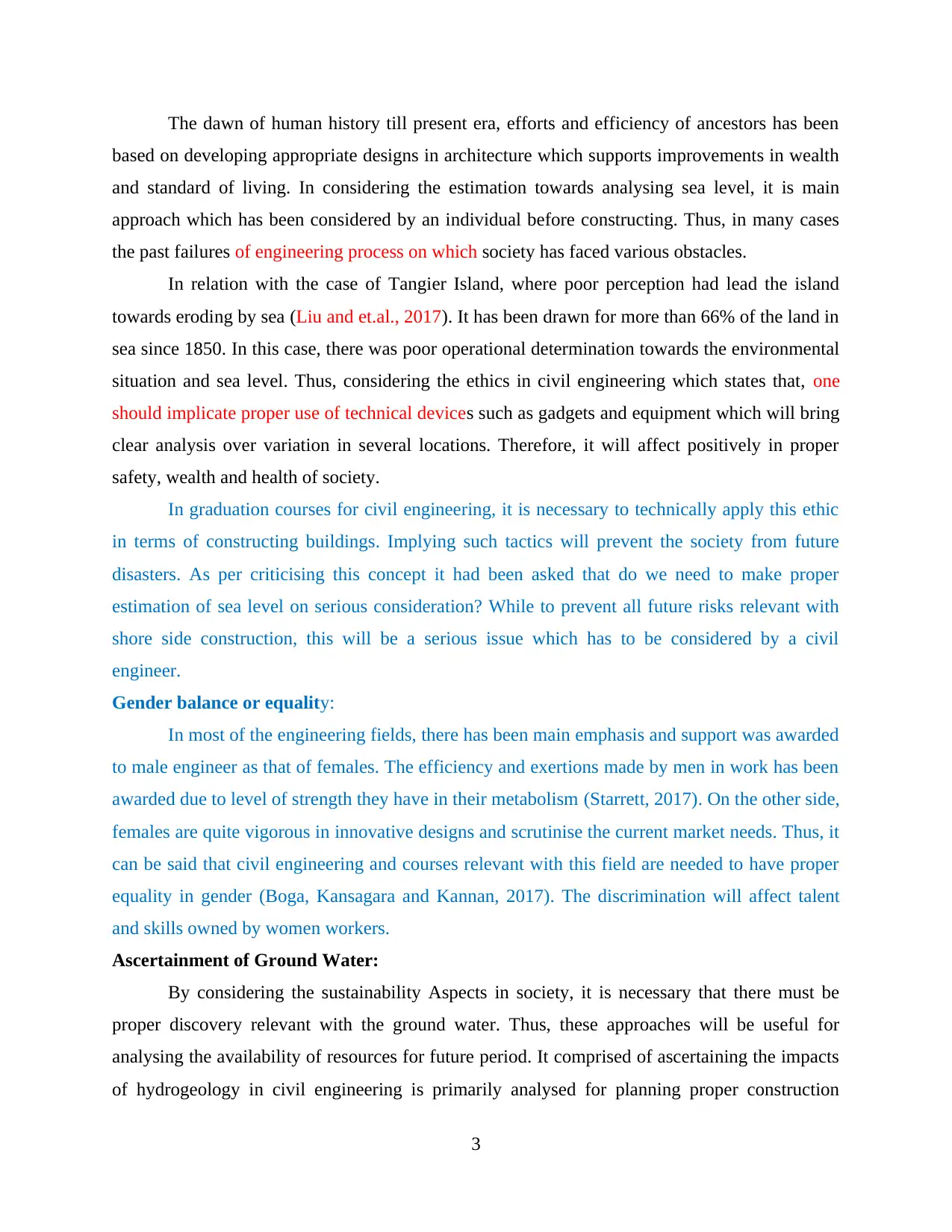
The dawn of human history till present era, efforts and efficiency of ancestors has been
based on developing appropriate designs in architecture which supports improvements in wealth
and standard of living. In considering the estimation towards analysing sea level, it is main
approach which has been considered by an individual before constructing. Thus, in many cases
the past failures of engineering process on which society has faced various obstacles.
In relation with the case of Tangier Island, where poor perception had lead the island
towards eroding by sea (Liu and et.al., 2017). It has been drawn for more than 66% of the land in
sea since 1850. In this case, there was poor operational determination towards the environmental
situation and sea level. Thus, considering the ethics in civil engineering which states that, one
should implicate proper use of technical devices such as gadgets and equipment which will bring
clear analysis over variation in several locations. Therefore, it will affect positively in proper
safety, wealth and health of society.
In graduation courses for civil engineering, it is necessary to technically apply this ethic
in terms of constructing buildings. Implying such tactics will prevent the society from future
disasters. As per criticising this concept it had been asked that do we need to make proper
estimation of sea level on serious consideration? While to prevent all future risks relevant with
shore side construction, this will be a serious issue which has to be considered by a civil
engineer.
Gender balance or equality:
In most of the engineering fields, there has been main emphasis and support was awarded
to male engineer as that of females. The efficiency and exertions made by men in work has been
awarded due to level of strength they have in their metabolism (Starrett, 2017). On the other side,
females are quite vigorous in innovative designs and scrutinise the current market needs. Thus, it
can be said that civil engineering and courses relevant with this field are needed to have proper
equality in gender (Boga, Kansagara and Kannan, 2017). The discrimination will affect talent
and skills owned by women workers.
Ascertainment of Ground Water:
By considering the sustainability Aspects in society, it is necessary that there must be
proper discovery relevant with the ground water. Thus, these approaches will be useful for
analysing the availability of resources for future period. It comprised of ascertaining the impacts
of hydrogeology in civil engineering is primarily analysed for planning proper construction
3
based on developing appropriate designs in architecture which supports improvements in wealth
and standard of living. In considering the estimation towards analysing sea level, it is main
approach which has been considered by an individual before constructing. Thus, in many cases
the past failures of engineering process on which society has faced various obstacles.
In relation with the case of Tangier Island, where poor perception had lead the island
towards eroding by sea (Liu and et.al., 2017). It has been drawn for more than 66% of the land in
sea since 1850. In this case, there was poor operational determination towards the environmental
situation and sea level. Thus, considering the ethics in civil engineering which states that, one
should implicate proper use of technical devices such as gadgets and equipment which will bring
clear analysis over variation in several locations. Therefore, it will affect positively in proper
safety, wealth and health of society.
In graduation courses for civil engineering, it is necessary to technically apply this ethic
in terms of constructing buildings. Implying such tactics will prevent the society from future
disasters. As per criticising this concept it had been asked that do we need to make proper
estimation of sea level on serious consideration? While to prevent all future risks relevant with
shore side construction, this will be a serious issue which has to be considered by a civil
engineer.
Gender balance or equality:
In most of the engineering fields, there has been main emphasis and support was awarded
to male engineer as that of females. The efficiency and exertions made by men in work has been
awarded due to level of strength they have in their metabolism (Starrett, 2017). On the other side,
females are quite vigorous in innovative designs and scrutinise the current market needs. Thus, it
can be said that civil engineering and courses relevant with this field are needed to have proper
equality in gender (Boga, Kansagara and Kannan, 2017). The discrimination will affect talent
and skills owned by women workers.
Ascertainment of Ground Water:
By considering the sustainability Aspects in society, it is necessary that there must be
proper discovery relevant with the ground water. Thus, these approaches will be useful for
analysing the availability of resources for future period. It comprised of ascertaining the impacts
of hydrogeology in civil engineering is primarily analysed for planning proper construction
3
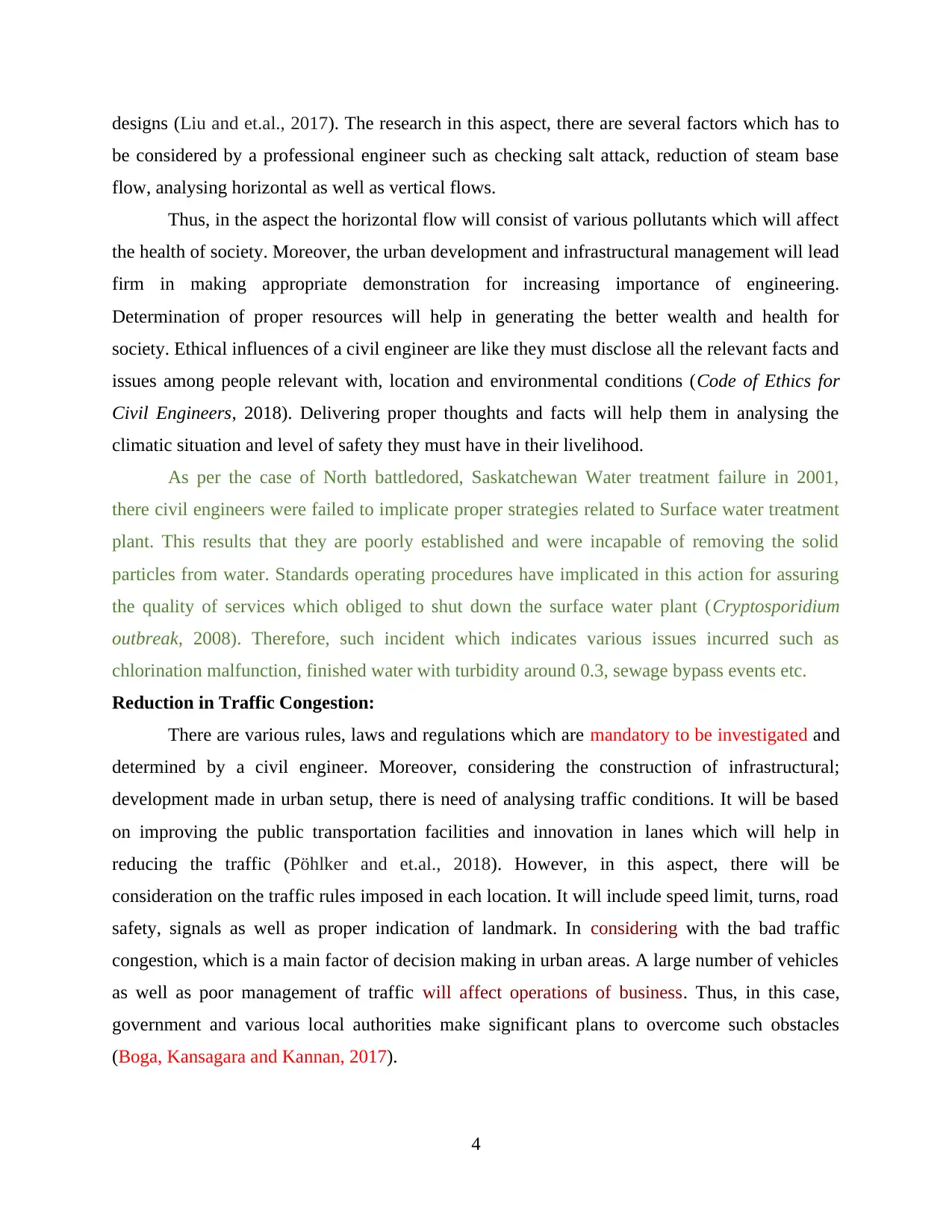
designs (Liu and et.al., 2017). The research in this aspect, there are several factors which has to
be considered by a professional engineer such as checking salt attack, reduction of steam base
flow, analysing horizontal as well as vertical flows.
Thus, in the aspect the horizontal flow will consist of various pollutants which will affect
the health of society. Moreover, the urban development and infrastructural management will lead
firm in making appropriate demonstration for increasing importance of engineering.
Determination of proper resources will help in generating the better wealth and health for
society. Ethical influences of a civil engineer are like they must disclose all the relevant facts and
issues among people relevant with, location and environmental conditions (Code of Ethics for
Civil Engineers, 2018). Delivering proper thoughts and facts will help them in analysing the
climatic situation and level of safety they must have in their livelihood.
As per the case of North battledored, Saskatchewan Water treatment failure in 2001,
there civil engineers were failed to implicate proper strategies related to Surface water treatment
plant. This results that they are poorly established and were incapable of removing the solid
particles from water. Standards operating procedures have implicated in this action for assuring
the quality of services which obliged to shut down the surface water plant (Cryptosporidium
outbreak, 2008). Therefore, such incident which indicates various issues incurred such as
chlorination malfunction, finished water with turbidity around 0.3, sewage bypass events etc.
Reduction in Traffic Congestion:
There are various rules, laws and regulations which are mandatory to be investigated and
determined by a civil engineer. Moreover, considering the construction of infrastructural;
development made in urban setup, there is need of analysing traffic conditions. It will be based
on improving the public transportation facilities and innovation in lanes which will help in
reducing the traffic (Pöhlker and et.al., 2018). However, in this aspect, there will be
consideration on the traffic rules imposed in each location. It will include speed limit, turns, road
safety, signals as well as proper indication of landmark. In considering with the bad traffic
congestion, which is a main factor of decision making in urban areas. A large number of vehicles
as well as poor management of traffic will affect operations of business. Thus, in this case,
government and various local authorities make significant plans to overcome such obstacles
(Boga, Kansagara and Kannan, 2017).
4
be considered by a professional engineer such as checking salt attack, reduction of steam base
flow, analysing horizontal as well as vertical flows.
Thus, in the aspect the horizontal flow will consist of various pollutants which will affect
the health of society. Moreover, the urban development and infrastructural management will lead
firm in making appropriate demonstration for increasing importance of engineering.
Determination of proper resources will help in generating the better wealth and health for
society. Ethical influences of a civil engineer are like they must disclose all the relevant facts and
issues among people relevant with, location and environmental conditions (Code of Ethics for
Civil Engineers, 2018). Delivering proper thoughts and facts will help them in analysing the
climatic situation and level of safety they must have in their livelihood.
As per the case of North battledored, Saskatchewan Water treatment failure in 2001,
there civil engineers were failed to implicate proper strategies related to Surface water treatment
plant. This results that they are poorly established and were incapable of removing the solid
particles from water. Standards operating procedures have implicated in this action for assuring
the quality of services which obliged to shut down the surface water plant (Cryptosporidium
outbreak, 2008). Therefore, such incident which indicates various issues incurred such as
chlorination malfunction, finished water with turbidity around 0.3, sewage bypass events etc.
Reduction in Traffic Congestion:
There are various rules, laws and regulations which are mandatory to be investigated and
determined by a civil engineer. Moreover, considering the construction of infrastructural;
development made in urban setup, there is need of analysing traffic conditions. It will be based
on improving the public transportation facilities and innovation in lanes which will help in
reducing the traffic (Pöhlker and et.al., 2018). However, in this aspect, there will be
consideration on the traffic rules imposed in each location. It will include speed limit, turns, road
safety, signals as well as proper indication of landmark. In considering with the bad traffic
congestion, which is a main factor of decision making in urban areas. A large number of vehicles
as well as poor management of traffic will affect operations of business. Thus, in this case,
government and various local authorities make significant plans to overcome such obstacles
(Boga, Kansagara and Kannan, 2017).
4
⊘ This is a preview!⊘
Do you want full access?
Subscribe today to unlock all pages.

Trusted by 1+ million students worldwide
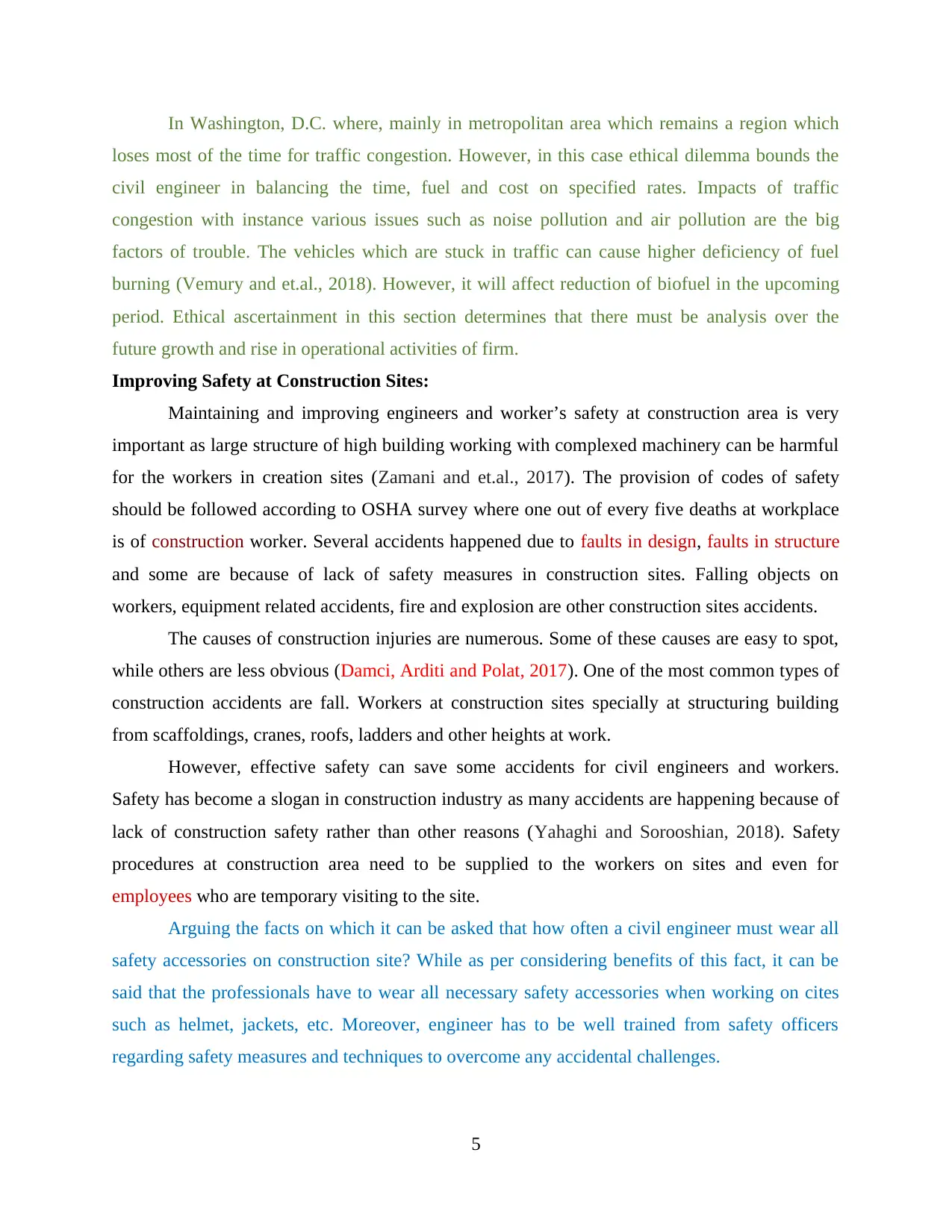
In Washington, D.C. where, mainly in metropolitan area which remains a region which
loses most of the time for traffic congestion. However, in this case ethical dilemma bounds the
civil engineer in balancing the time, fuel and cost on specified rates. Impacts of traffic
congestion with instance various issues such as noise pollution and air pollution are the big
factors of trouble. The vehicles which are stuck in traffic can cause higher deficiency of fuel
burning (Vemury and et.al., 2018). However, it will affect reduction of biofuel in the upcoming
period. Ethical ascertainment in this section determines that there must be analysis over the
future growth and rise in operational activities of firm.
Improving Safety at Construction Sites:
Maintaining and improving engineers and worker’s safety at construction area is very
important as large structure of high building working with complexed machinery can be harmful
for the workers in creation sites (Zamani and et.al., 2017). The provision of codes of safety
should be followed according to OSHA survey where one out of every five deaths at workplace
is of construction worker. Several accidents happened due to faults in design, faults in structure
and some are because of lack of safety measures in construction sites. Falling objects on
workers, equipment related accidents, fire and explosion are other construction sites accidents.
The causes of construction injuries are numerous. Some of these causes are easy to spot,
while others are less obvious (Damci, Arditi and Polat, 2017). One of the most common types of
construction accidents are fall. Workers at construction sites specially at structuring building
from scaffoldings, cranes, roofs, ladders and other heights at work.
However, effective safety can save some accidents for civil engineers and workers.
Safety has become a slogan in construction industry as many accidents are happening because of
lack of construction safety rather than other reasons (Yahaghi and Sorooshian, 2018). Safety
procedures at construction area need to be supplied to the workers on sites and even for
employees who are temporary visiting to the site.
Arguing the facts on which it can be asked that how often a civil engineer must wear all
safety accessories on construction site? While as per considering benefits of this fact, it can be
said that the professionals have to wear all necessary safety accessories when working on cites
such as helmet, jackets, etc. Moreover, engineer has to be well trained from safety officers
regarding safety measures and techniques to overcome any accidental challenges.
5
loses most of the time for traffic congestion. However, in this case ethical dilemma bounds the
civil engineer in balancing the time, fuel and cost on specified rates. Impacts of traffic
congestion with instance various issues such as noise pollution and air pollution are the big
factors of trouble. The vehicles which are stuck in traffic can cause higher deficiency of fuel
burning (Vemury and et.al., 2018). However, it will affect reduction of biofuel in the upcoming
period. Ethical ascertainment in this section determines that there must be analysis over the
future growth and rise in operational activities of firm.
Improving Safety at Construction Sites:
Maintaining and improving engineers and worker’s safety at construction area is very
important as large structure of high building working with complexed machinery can be harmful
for the workers in creation sites (Zamani and et.al., 2017). The provision of codes of safety
should be followed according to OSHA survey where one out of every five deaths at workplace
is of construction worker. Several accidents happened due to faults in design, faults in structure
and some are because of lack of safety measures in construction sites. Falling objects on
workers, equipment related accidents, fire and explosion are other construction sites accidents.
The causes of construction injuries are numerous. Some of these causes are easy to spot,
while others are less obvious (Damci, Arditi and Polat, 2017). One of the most common types of
construction accidents are fall. Workers at construction sites specially at structuring building
from scaffoldings, cranes, roofs, ladders and other heights at work.
However, effective safety can save some accidents for civil engineers and workers.
Safety has become a slogan in construction industry as many accidents are happening because of
lack of construction safety rather than other reasons (Yahaghi and Sorooshian, 2018). Safety
procedures at construction area need to be supplied to the workers on sites and even for
employees who are temporary visiting to the site.
Arguing the facts on which it can be asked that how often a civil engineer must wear all
safety accessories on construction site? While as per considering benefits of this fact, it can be
said that the professionals have to wear all necessary safety accessories when working on cites
such as helmet, jackets, etc. Moreover, engineer has to be well trained from safety officers
regarding safety measures and techniques to overcome any accidental challenges.
5
Paraphrase This Document
Need a fresh take? Get an instant paraphrase of this document with our AI Paraphraser
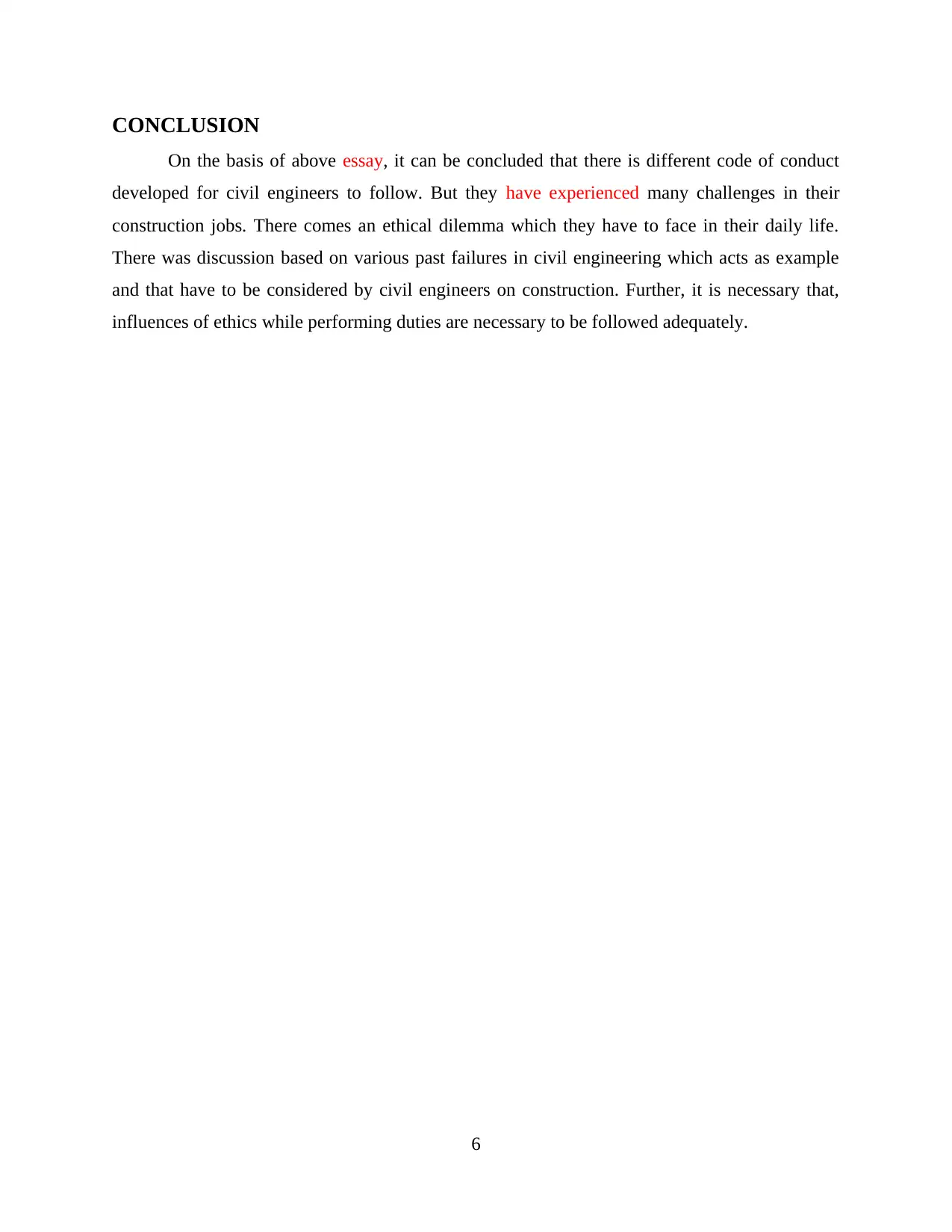
CONCLUSION
On the basis of above essay, it can be concluded that there is different code of conduct
developed for civil engineers to follow. But they have experienced many challenges in their
construction jobs. There comes an ethical dilemma which they have to face in their daily life.
There was discussion based on various past failures in civil engineering which acts as example
and that have to be considered by civil engineers on construction. Further, it is necessary that,
influences of ethics while performing duties are necessary to be followed adequately.
6
On the basis of above essay, it can be concluded that there is different code of conduct
developed for civil engineers to follow. But they have experienced many challenges in their
construction jobs. There comes an ethical dilemma which they have to face in their daily life.
There was discussion based on various past failures in civil engineering which acts as example
and that have to be considered by civil engineers on construction. Further, it is necessary that,
influences of ethics while performing duties are necessary to be followed adequately.
6
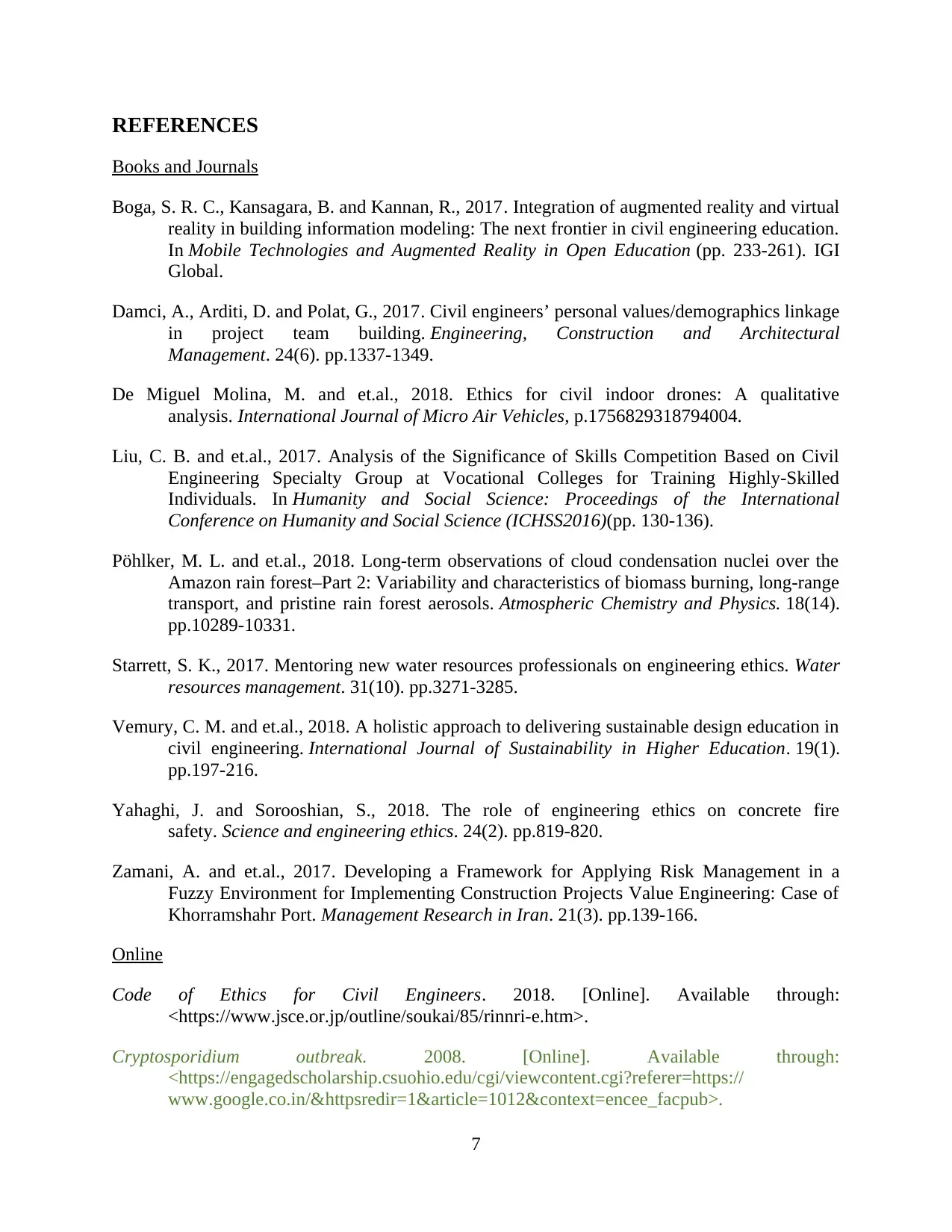
REFERENCES
Books and Journals
Boga, S. R. C., Kansagara, B. and Kannan, R., 2017. Integration of augmented reality and virtual
reality in building information modeling: The next frontier in civil engineering education.
In Mobile Technologies and Augmented Reality in Open Education (pp. 233-261). IGI
Global.
Damci, A., Arditi, D. and Polat, G., 2017. Civil engineers’ personal values/demographics linkage
in project team building. Engineering, Construction and Architectural
Management. 24(6). pp.1337-1349.
De Miguel Molina, M. and et.al., 2018. Ethics for civil indoor drones: A qualitative
analysis. International Journal of Micro Air Vehicles, p.1756829318794004.
Liu, C. B. and et.al., 2017. Analysis of the Significance of Skills Competition Based on Civil
Engineering Specialty Group at Vocational Colleges for Training Highly-Skilled
Individuals. In Humanity and Social Science: Proceedings of the International
Conference on Humanity and Social Science (ICHSS2016)(pp. 130-136).
Pöhlker, M. L. and et.al., 2018. Long-term observations of cloud condensation nuclei over the
Amazon rain forest–Part 2: Variability and characteristics of biomass burning, long-range
transport, and pristine rain forest aerosols. Atmospheric Chemistry and Physics. 18(14).
pp.10289-10331.
Starrett, S. K., 2017. Mentoring new water resources professionals on engineering ethics. Water
resources management. 31(10). pp.3271-3285.
Vemury, C. M. and et.al., 2018. A holistic approach to delivering sustainable design education in
civil engineering. International Journal of Sustainability in Higher Education. 19(1).
pp.197-216.
Yahaghi, J. and Sorooshian, S., 2018. The role of engineering ethics on concrete fire
safety. Science and engineering ethics. 24(2). pp.819-820.
Zamani, A. and et.al., 2017. Developing a Framework for Applying Risk Management in a
Fuzzy Environment for Implementing Construction Projects Value Engineering: Case of
Khorramshahr Port. Management Research in Iran. 21(3). pp.139-166.
Online
Code of Ethics for Civil Engineers. 2018. [Online]. Available through:
<https://www.jsce.or.jp/outline/soukai/85/rinnri-e.htm>.
Cryptosporidium outbreak. 2008. [Online]. Available through:
<https://engagedscholarship.csuohio.edu/cgi/viewcontent.cgi?referer=https://
www.google.co.in/&httpsredir=1&article=1012&context=encee_facpub>.
7
Books and Journals
Boga, S. R. C., Kansagara, B. and Kannan, R., 2017. Integration of augmented reality and virtual
reality in building information modeling: The next frontier in civil engineering education.
In Mobile Technologies and Augmented Reality in Open Education (pp. 233-261). IGI
Global.
Damci, A., Arditi, D. and Polat, G., 2017. Civil engineers’ personal values/demographics linkage
in project team building. Engineering, Construction and Architectural
Management. 24(6). pp.1337-1349.
De Miguel Molina, M. and et.al., 2018. Ethics for civil indoor drones: A qualitative
analysis. International Journal of Micro Air Vehicles, p.1756829318794004.
Liu, C. B. and et.al., 2017. Analysis of the Significance of Skills Competition Based on Civil
Engineering Specialty Group at Vocational Colleges for Training Highly-Skilled
Individuals. In Humanity and Social Science: Proceedings of the International
Conference on Humanity and Social Science (ICHSS2016)(pp. 130-136).
Pöhlker, M. L. and et.al., 2018. Long-term observations of cloud condensation nuclei over the
Amazon rain forest–Part 2: Variability and characteristics of biomass burning, long-range
transport, and pristine rain forest aerosols. Atmospheric Chemistry and Physics. 18(14).
pp.10289-10331.
Starrett, S. K., 2017. Mentoring new water resources professionals on engineering ethics. Water
resources management. 31(10). pp.3271-3285.
Vemury, C. M. and et.al., 2018. A holistic approach to delivering sustainable design education in
civil engineering. International Journal of Sustainability in Higher Education. 19(1).
pp.197-216.
Yahaghi, J. and Sorooshian, S., 2018. The role of engineering ethics on concrete fire
safety. Science and engineering ethics. 24(2). pp.819-820.
Zamani, A. and et.al., 2017. Developing a Framework for Applying Risk Management in a
Fuzzy Environment for Implementing Construction Projects Value Engineering: Case of
Khorramshahr Port. Management Research in Iran. 21(3). pp.139-166.
Online
Code of Ethics for Civil Engineers. 2018. [Online]. Available through:
<https://www.jsce.or.jp/outline/soukai/85/rinnri-e.htm>.
Cryptosporidium outbreak. 2008. [Online]. Available through:
<https://engagedscholarship.csuohio.edu/cgi/viewcontent.cgi?referer=https://
www.google.co.in/&httpsredir=1&article=1012&context=encee_facpub>.
7
⊘ This is a preview!⊘
Do you want full access?
Subscribe today to unlock all pages.

Trusted by 1+ million students worldwide
1 out of 9
Related Documents
Your All-in-One AI-Powered Toolkit for Academic Success.
+13062052269
info@desklib.com
Available 24*7 on WhatsApp / Email
![[object Object]](/_next/static/media/star-bottom.7253800d.svg)
Unlock your academic potential
Copyright © 2020–2026 A2Z Services. All Rights Reserved. Developed and managed by ZUCOL.





